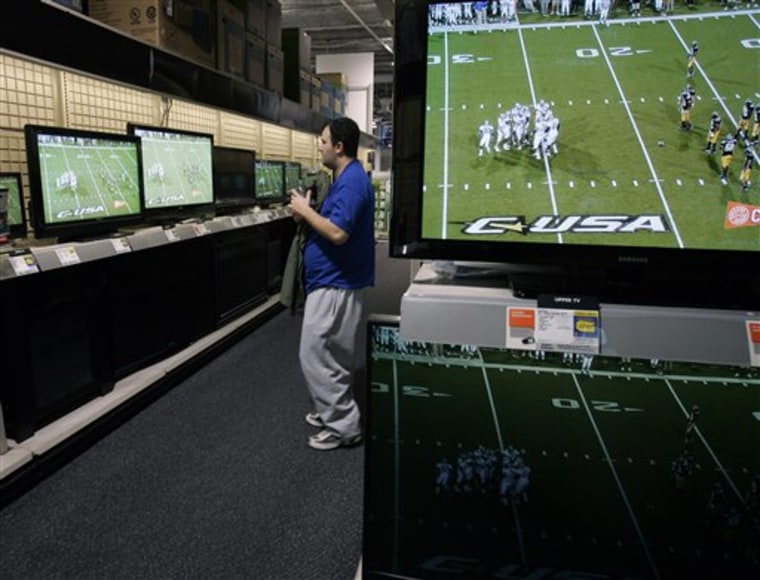Is an extra $800 in your pocket enough to change the course of the ailing economy?
President Bush, Treasury Secretary Henry Paulson and members of Congress seem to think so. Washington is talking about issuing tax rebate checks in hopes of staving off a recession.
And people around the country, many of them struggling to pay bills, staggering under credit card debt or worried about their financial futures, aren't about to turn them down.
"I would probably take that money and breathe a sigh of relief for one month," said Jennifer Simon, who works at a small communications firm in Long Valley, N.J., and spends $1,500 a month on child care.
"It's not a permanent fix," she said, "but I wouldn't send it back."
Taxpayers got smaller rebates, $300 per person, under a similar plan in 2001. There is debate in economic circles — as usual — about whether those checks warded off recession or went straight from the U.S. Treasury into Americans' savings accounts.
This time around, while some people may put the rebate toward a big-ticket item like a flat-screen TV, many echo Ginger Scott, a home-health physical therapy worker in Kansas City, Mo. She says she wouldn't buy anything exciting.
"I think I had too much exciting previously," said Scott, 52. "Exciting will kill your budget." Instead, she said she'd pay off a credit card bill and save what's left over.
President Bush on Friday embraced as much as $150 billion in tax relief, most of it for individuals, to jump-start the economy. He said the country would be "just fine" if Congress passes the stimulus.
While the administration is avoiding specifics, congressional aides said the White House was considering rebates of up to $800 for individuals and $1,600 for married couples. The checks could arrive by late spring.
In interviews, Americans gave a range of ideas for how they'd spend the money, some of them reflecting the pinch of a difficult economy in which the costs of food and gas are rising and jobs are harder to come by.
Take DaMel Nixon, 33, a mailhouse quality control supervisor in Lansing, Mich., who used to be an avid buyer of music but is unlikely to use his $800 to splurge on CDs because he needs money for gas.
"I'm going to need that $20 to put in the tank," he said.
In Fargo, N.D., Doug Benson said he would spend half of the $800 on bills and half on new beds for his children. In New York City, Landy Ung said she would plow the money into her startup Internet business as an incentive for her salespeople.
At a mall in Madison, Wis., Antonia Rivera said would love a new pair of snow boots, but said she'd save the cash anyway. She hopes to retire from her job as a supply clerk at the University of Wisconsin Hospital next year but fears she may not have enough money.
So she's cutting back on all her purchases. "If I need it, I look for the best price," said Rivera, who is 68. "If I don't really need it, I don't buy anything."
And in Kansas City, Jenise Lemmones said she'd let her 8-year-old granddaughter, who lives with her, call the shots: "She just likes to go to McDonald's and the movies."
When the 2001 rebates went out, two-thirds of the cash was spent within six months, according to one paper published by the National Bureau of Economic Research, a private research group that serves as the national arbiter on such matters.
Fans of the rebate say that spending was enough to keep the country out of a longer, more painful recession.
"The recession officially ended the month after the stimulus package checks were sent out," said David Wyss, chief economist at Standard & Poor's.
But a conflicting report, also published by the National Bureau of Economic Research, found the bump in spending went almost entirely to the auto sector, which was then offering zero-percent financing.
"The majority of consumers saved or paid off a debt rather than spending it," said Matthew Shapiro, professor of economics at University of Michigan, who co-wrote the second report.
Economists do agree on this much: A stimulus like this is a one-shot deal.
"Once people have spent it, they may ask, 'Who's going to cover next month's expenses?'" said economist Edward Yardeni, who runs his own research firm.
Still, if the stimulus package passes and it works, it could be worth every penny because the government will save a fortune in the long run, said Mark Zandi, chief economist at Moody's Economy.com.
A deep recession would mean lower tax receipts coupled with increased spending on unemployment insurance payments, welfare and food stamps.
"One hundred-fifty billion dollars, could, in the end, save us $500 billion if it saves us from a long, lengthy, severe recession," he said.
That's not enough for Scott, the Kansas City home-health worker. She wants a long-term fix including tax breaks for health insurance payments by the self-employed or more investment in small business.
She is suspicious of the tax rebate stimulus because "we like to gratify ourselves quickly in this country," she said. "We buy things we can't afford. We are a charge nation."
